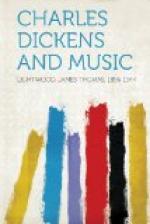OLD KING COLE (O.C.S. 58, P.P. 36)
The personality of this gentleman has never been settled. Chappell suggests he was ‘Old Cole,’ a cloth-maker of Reading temp. Henry I. Wardle’s carol ‘I care not for spring’ (P.P. 36) was adapted to this air, and printed in How’s Illustrated Book of British Song.
OVER THE HILLS AND FAR AWAY (Dr. M., M.C. 36)
An old saying, both in song and as a phrase. It occurs in two songs in D’Urfey’s Pills to Purge Melancholy, 1709, one of which is,
Tom he was a piper’s son,
He learned to play when he was young;
But all the tune that he could play
Was over the hills and far away.
(Vol. iv.)
Doctor Marigold’s version is probably original:
North and South and West and East,
Winds liked best and winds liked least,
Here and there and gone astray,
Over the hills and far away.
OVER THE WATER TO CHARLIE (O.C.S. 27)
Tune in Johnson’s Musical Museum, Vol. II, 1788.
Come boat me o’er, come
row me o’er,
Come boat me o’er
to Charlie,
I’ll gie John Brown
another half-crown,
To boat me o’er
to Charlie;
We’ll o’er the
water, we’ll o’er the sea,
We’ll o’er
the water to Charlie,
Come weal, come woe, we’ll
gather and go,
And live or die
wi’ Charlie.
Another Jacobite song was the cause of an amusing incident at Edinburgh. On the occasion of one of his visits there Dickens went to the theatre, and he and his friends were much amazed and amused by the orchestra playing ‘Charlie is my darling’ amid tumultuous shouts of delight.
PAUL AND VIRGINIA (S.B.T. 7, L.D. 13)
J.
Mazzinghi.
The popular duet from this opera ‘See from ocean rising’ was sung by Mr. Johnstone and Mr. Incledon. See p. 91.
POLLY PUT THE KETTLE ON (B.R. 24)
An old country dance.
RED RUFFIAN, RETIRE! (S.B.C. 8)
Probably an imaginary title, invented by Dickens.
RULE BRITANNIA (D. & S. 4, 39, U.T. 2, M.C. 11, 17, A.N., D.C. 8)
Words by Thomson or Mallet. Arne.
First appeared in print at the end of the masque The Judgement of Paris, but it was composed for the masque of Alfred, which was first performed on August 1, 1740. See Musical Times, April, 1900.




